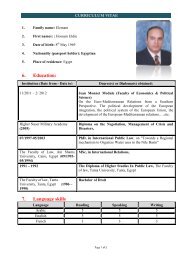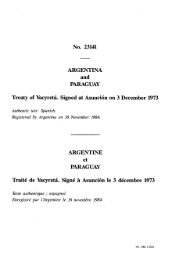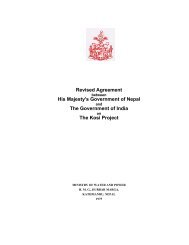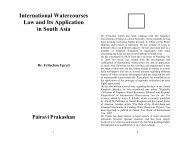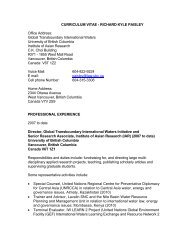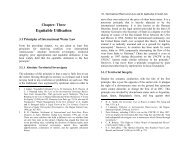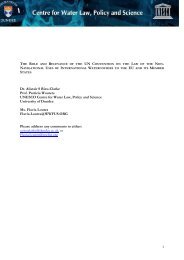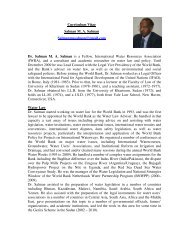Upreti, Trilochan, International Watercourses Law and Its Application ...
Upreti, Trilochan, International Watercourses Law and Its Application ...
Upreti, Trilochan, International Watercourses Law and Its Application ...
Create successful ePaper yourself
Turn your PDF publications into a flip-book with our unique Google optimized e-Paper software.
Equitable Utilisation / 151 152 / <strong>International</strong> <strong>Watercourses</strong> <strong>Law</strong> <strong>and</strong> <strong>Its</strong> <strong>Application</strong> in South Asia“an equitable <strong>and</strong> reasonable manner”, which should take intoconsideration the geographic, hydrographic, hydrological,climatic <strong>and</strong> other factors of a natural character (as explainedabove in Article 6 of UNCIW). These include the social <strong>and</strong>economical needs of the watercourses states, existing <strong>and</strong>potential uses of resources, the effects of the use in onewatercourse system, conservation, protection, development <strong>and</strong>economic use of the water resources <strong>and</strong> the availability ofalternatives. 1423.7.5 Common Heritage EquityThe common heritage of mankind is related to the rights ofpatrimony, not only to a certain state or group of states but toall nations <strong>and</strong> peoples. This includes natural <strong>and</strong> geographicalelements, such as clean environment, water, ocean, airspace,Antarctica, <strong>and</strong> the Moon, which are required for the existence<strong>and</strong> sustenance of human beings <strong>and</strong> nature, <strong>and</strong> are to beprotected, preserved <strong>and</strong> sustained for the present as well asfuture generations. There are conventional arrangements, theLOSC provision relating to the seabed authority <strong>and</strong> the UNMoon Agreement, 143 explicitly seeking to regulate this field ofinternational law.The LOSC established (Article 156) an <strong>International</strong> DeepSeabed Authority to manage <strong>and</strong> distribute equitably thebenefits derived from exploitation of the common heritageelement of marine resources. 144 The Authority is analogous to acorporation, having been established to facilitate exploitation ofan asset (the deep seabed) for the benefit of mankind.Recognising the right of a coastal state in its EEZ, theConvention requires the coastal state to contribute to theAuthority at least a fraction of the benefit derived from mining142 Article 5, 6, 7, 8 & 20-25 of the UNCIW.143 18 ILM (1979), pp. 1434- 1441.144 Supra note 140, p. 1298.in these areas. After five years of production, this amounts to1% of the value of the production escalating by 1% eachsubsequent year until the twelfth year. It stabilises at 7%, theamount being disbursed to the parties to the conventionaccording to 'equitable sharing criteria', taking into account theinterests <strong>and</strong> needs of developing states, particularly those ofthe least developed <strong>and</strong> l<strong>and</strong> locked states. 145 This systemsimply seeks to regulate the EEZ <strong>and</strong> a certain proportion of theaccrued benefits are to be distributed to all nations equitably;particularly to economically weak, developing, <strong>and</strong> l<strong>and</strong>lockednations. It is a good example of distributive justice in sharingthe benefit from a common heritage.The UN Moon Agreement, which opened for signature in 1979,also includes elements of common heritage equity. 146 Theagreement emphasises the conservation of the Moon, <strong>and</strong> seeksto facilitate the exploitation <strong>and</strong> equitable allocation of itsresources. It states:"the moon <strong>and</strong> its natural resources are the commonheritage of mankind … exploration <strong>and</strong> use of themoon … shall be carried out for the benefit <strong>and</strong>interest of all countries”. 147The agreement calls on states to devise a regime to govern theexploitation of the moon with the purpose of facilitating theorderly development, rational management, <strong>and</strong> equitablesharing of its resources. States are prohibited from causingpollution or any other acts disturbing the moon's environment,<strong>and</strong> are obliged to 'pay due regard' to the needs of futuregenerations.145 Article 82, LOSC, Ibid. p. 1286.146 18 ILM (1979) p. 1434, Agreement Governing the Activities of Stateson the Moon <strong>and</strong> Other Celestial Bodies- hereafter the MoonAgreement.147 Ibid. pp 1435- 1438.



